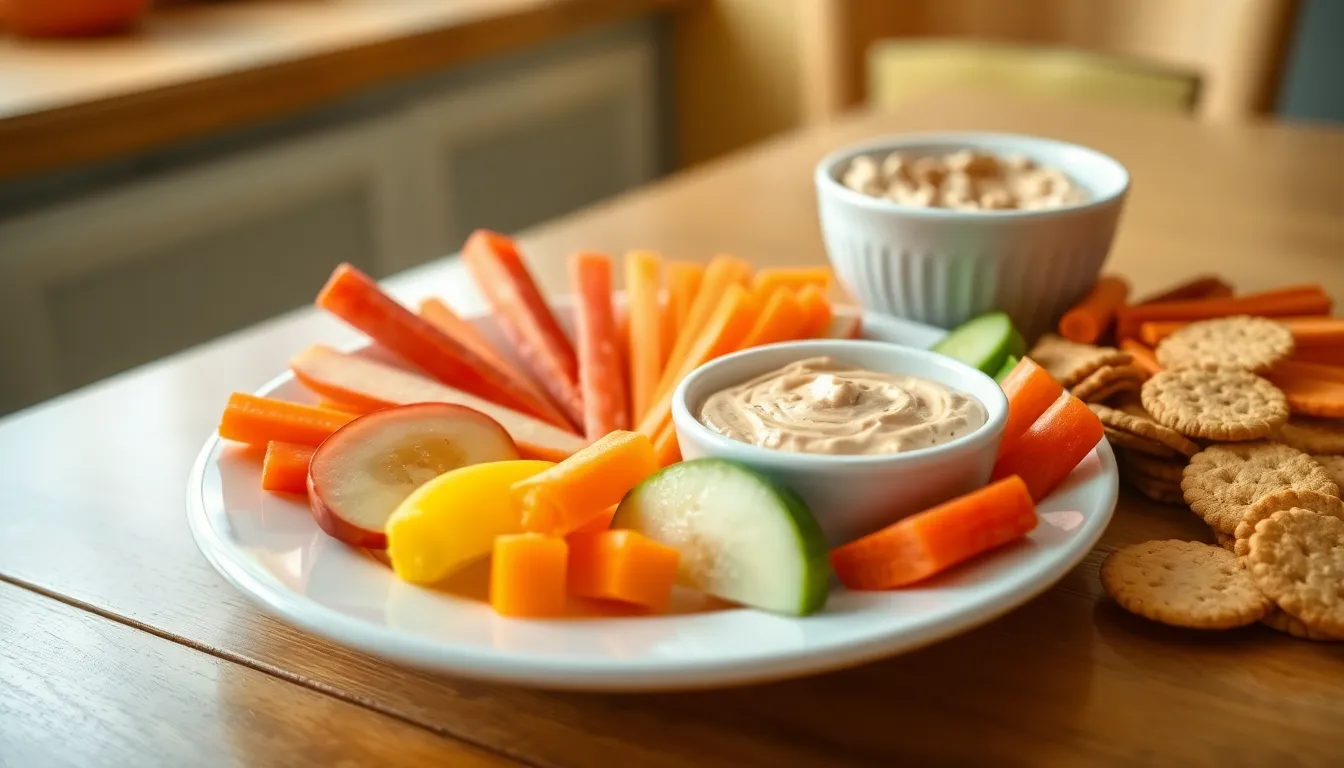Table of Contents
ToggleWhen it comes to kids and snacks, it’s a battle of wills. Parents want nutritious options while kids dream of sugary treats that could power a rocket. But fear not! Healthy snacks don’t have to be boring or bland. With a little creativity, they can be as exciting as a treasure hunt in a candy store—minus the sugar crash.
Importance Of Healthy Snacks For Kids
Healthy snacks play a crucial role in a child’s overall wellbeing. Providing nutritious options helps support optimal growth and energy levels throughout the day.
Nutritional Benefits
Healthy snacks deliver essential vitamins, minerals, and nutrients. Fresh fruits, vegetables, and whole grains offer fiber that aids digestion and promotes satiety. Nutritious snacks can improve concentration and focus, allowing children to perform better academically. Choosing snacks rich in protein, such as yogurt or nuts, enhances their energy and supports muscle development. By prioritizing healthier options, parents can foster lifelong healthy eating habits in their children.
Impact On Growth And Development
Healthy snacks significantly influence a child’s physical growth and cognitive development. Consuming enough calcium from snacks like cheese and yogurt promotes strong bones and teeth. Iron-rich snacks, such as fruits and vegetables, play a vital role in healthy blood circulation. Nutrient-dense treats support brain function, helping kids excel in school. Regularly opting for nutritious snacks aids in maintaining a healthy weight, which contributes to overall wellness and prevents obesity-related complications.
Types Of Healthy Snacks For Kids

Healthy snacks offer an array of choices that cater to children’s taste preferences while providing essential nutrients. Parents can choose from various options, including fruits, whole grains, and protein-rich selections.
Fruits And Vegetables
Fruits and vegetables are vibrant and nutrient-packed. Fresh options like apple slices, carrot sticks, and cucumber rounds make for satisfying snacks. Dried fruits, such as raisins and apricots, provide sweetness and energy. Incorporating dips, like yogurt or hummus, can enhance the enjoyment factor. Research indicates that colorful produce boosts essential vitamins and minerals, essential for growing bodies.
Whole Grains
Whole grains serve as a great snack base, offering fiber and sustained energy. Options such as whole-grain crackers, popcorn, and oatmeal cookies provide crunchy satisfaction. Pairing these grains with dips or nut butters adds flavor and nutrients. Studies show that whole grains promote better digestion and support stable blood sugar levels, benefiting kids’ overall health.
Protein-Rich Options
Protein-rich snacks contribute significantly to the development of children. Snack choices like yogurt, cheese sticks, and hard-boiled eggs deliver necessary protein for muscle growth. Nut mixes or sunflower seed butter can make tasty accompaniments. Evidence suggests that protein improves satiety, allowing kids to feel fuller longer, which aids in maintaining healthy eating habits.
Tips For Choosing Healthy Snacks
Selecting healthy snacks requires attention to detail. Parents can maximize nutrition while considering taste and variety.
Reading Nutrition Labels
Understanding nutrition labels is crucial. Parents should check for added sugars, unhealthy fats, and sodium content. Look for snacks that list whole foods as the first ingredients. A snack rich in fiber contributes to satiety and digestive health. Comparing similar products helps identify the healthiest option. Choose items with fewer than 10 grams of sugar per serving. Remember, organic or natural labels don’t always guarantee health benefits. Prioritizing transparency on labels leads to informed snacking decisions.
Portion Control
Managing portion sizes supports balanced nutrition. Children benefit from smaller, age-appropriate servings. Encourage kids to eat snacks mindfully, paying attention to their hunger cues. Using smaller plates or bowls can visually help control portions. Pre-packaged portions offer convenience and reduce the chances of overeating. Cutting snacks into smaller pieces may enhance enjoyment and satisfaction. Frequent, smaller snacks maintain energy levels throughout the day. Maintaining portion awareness fosters healthy eating habits and prevents excessive calorie intake.
Creative Ways To Serve Healthy Snacks
Engaging children in healthy snacking can involve creative serving methods that make nutritious options appealing. Fun presentations and active participation in preparation spark excitement for healthy foods.
Fun Presentation Ideas
Shapes and colors enhance snack appeal. Use cookie cutters to create shapes from fruits and veggies. Arrange colorful fruit skewers for a delightful treat. Create fun faces on whole-grain toast using spreads like hummus and toppings such as cucumber slices and cherry tomatoes. Serve yogurt in colorful cups topped with fresh berries for visual appeal. Design healthy snack platters with a variety of textures and colors, ensuring every component catches the child’s eye.
Involvement In Snack Preparation
Involving kids in snack-making promotes a sense of ownership. Encourage them to select their favorite fruits and veggies at the store. Assign tasks like washing produce or assembling snacks, which enhances their interest in healthy options. Allow kids to create their own trail mix using choices like nuts, seeds, and dried fruits. Emphasizing collaboration not only fosters healthy habits but also strengthens bonds between parent and child during snack time.
Healthy snacks play a vital role in children’s growth and development. By prioritizing nutritious options parents can significantly influence their kids’ eating habits. Offering a variety of colorful fruits vegetables whole grains and protein-rich snacks not only satisfies cravings but also supports overall wellbeing.
Engaging children in the preparation and presentation of these snacks can make them more appealing and enjoyable. This approach fosters a positive relationship with food while encouraging lifelong healthy choices. With creativity and mindfulness parents can turn snack time into a fun and nutritious experience that benefits their children now and in the future.






